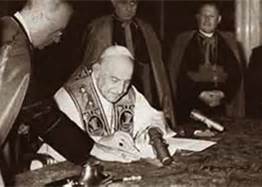
Note: I first came across the story of Norman Cousins and his role as Pope John XXIII’s peace-making envoy to and between JFK and Nikita Khrushchev while reading James Douglas’s excellent book, “JFK and the Unspeakable: Why He Died and Why It Matters” several years ago. In the course of researching and writing this series of articles on the events leading up to John Kennedy’s assassination I have had the opportunity to delve much deeper into this remarkable and, to most Americans, largely unknown few months of history; the period between the end of the Cuban Missile Crisis in late October, 1962 and Kennedy’s famous “Peace Speech” at American University on June 10th, 1963. It was during these few months that Cousins undertook two missions as the Pope’s emissary to the world’s two most powerful leaders and Cold War opponents, Kennedy and Khrushchev. In researching Norman Cousins I discovered that in 1972, nine years after the incidents themselves, he published his account of his experiences on these historic missions in a book entitled “The Improbable Triumvirate: An Asterisk to the History of a Hopeful Year, 1962-1963”. Upon finding this I immediately logged on to Amazon.com to purchase a copy, only to discover the book was out of print. Undaunted, I purchased a used hard back edition for $40 and a few days later I had it in my hands. Thus, in these articles you are getting the firsthand account of Norman Cousins himself as to what he actually did and said, as well as Kennedy and Khrushchev, on the missions he undertook as Pope John’s peace-brokering representative. By knowing and understanding this history you are eyewitness to the changes that both Kennedy and Khrushchev, prompted by a dying Pope and a humanitarian journalist, were making in the direction of ending the arms race and the Cold War. It is riveting history and has everything to do with why Kennedy was killed. Here is Part III of “Improbable Peace Makers”…MA
____________________________________
Exactly one week after Norman Cousins had requested another meeting with Soviet Premier Nikita Khrushchev he took a phone call from Soviet Ambassador Anatoly Dobrynin informing him that Khrushchev would be pleased to see him in Moscow on April 12th. Cousins immediately informed Secretary of State Dean Rusk that his request to meet with the Soviet leader had been approved, and he began to prepare for his journey. This time he planned to take his two oldest daughters with him; Andrea, a college senior, and Candis, a high school senior. On his first trip to meet Khrushchev in December the Premier had asked Cousins if he had brought his wife and daughters to Russia with him. When Cousins responded in the negative Khrushchev regarded him severely and said, “For shame!” Cousins tried to explain that the kids had school to attend, to which Khrushchev had responded: “School? Nonsense! They don’t teach anything in the schools as important as they could learn traveling with Papa.”
Not wanting to be scolded twice by Khrushchev, Cousins decided to bring his girls with him.
The day before he was to leave on his mission Cousins received a phone call from the White House. On the other end of the line was President Kennedy himself.
“About your trip,” JFK said, “Dean Rusk has already spoken to you of our hope that we can get the test ban (treaty) unblocked…”
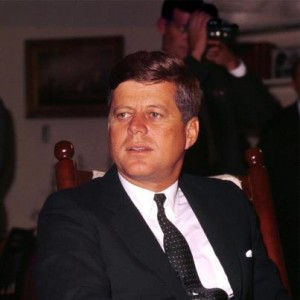
Kennedy went on to say that he had no doubt that Khrushchev was sincere in his belief that the U.S. had reneged on its supposed offer of 3 inspections, but that Cousins needed to understand that the Soviet leader was wrong. The President stated that Khrushchev was basing his entire opinion on an exchange that had occurred between the top negotiators for each country that had been clearly misunderstood by the Soviet side. But, the President felt, it was an honest misunderstanding and he had no desire to argue about who was correct, or to impugn anyone’s integrity or honor. Kennedy asked Cousins to attest to Khrushchev that the President was operating in good faith, and to see if he could get the Premier to agree that there had been an honest misunderstanding and to be willing to make a fresh start. JFK closed his message to Cousins by wishing him good luck on the mission and asking him to contact the the White House on his return. Thus briefed by the President, Norman Cousins and his two daughters departed for Moscow. There would, however, be an important stop on the way…The Vatican and Pope John.
On arriving in Rome, Cousins spent two days being briefed by the Pope’s representatives; the Pope himself being largely confined to his bed now because of his cancer. The big news they conveyed to Cousins was that the Pope’s encyclical on world peace, entitled “Pacem in Terris” (Peace on Earth), was completed and would be published within a couple of days. Cousins would be provided with an advance copy to present to Chairman Khrushchev [1] at their meeting. One of the men briefing Cousins on behalf of the Pope was Monsignor Igino Cardinale. He told Cousins that “Pacem in Terris” will be the Pope’s “magnificent legacy”. The encyclical, he said, “…deals with the principal questions involved in war and peace…it is a courageous document. It is the best of a very great Pope.”
Published at the time it was, at the height of the Cold War, “Pacem in Terris” was, and still is today, a major work. Addressed to “all men of good will”, it was the first Papal encyclical that intended a larger audience than Catholics. The text of the encyclical commences as follows:
“Peace on Earth—which man throughout the ages has so longed for and sought after—can never be established, never guaranteed, except by the diligent observance of the divinely established order…”
It then goes on to describe this “divinely established order” as the work of God and that it is perfect in its creation. And yet, Pope John states:
“…there is a disunity among individuals and among nations which is in striking contrast to this perfect order in the universe. One would think that the relationships that bind men together could only be governed by force.”
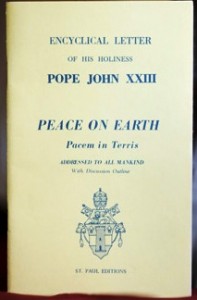
As he progresses through the message of the encyclical Pope John emphasizes that world peace can only be accomplished by adherence to the “divine order” as manifested within each individual person, and thus a huge part of his encyclical deals with the subject of human rights, at times sounding not unlike the founding documents of the United States. Pope John introduces the section of “Pacem in Terris” that addresses these rights as follows:
“We must devote our attention first of all to that order which should prevail among men … Any well-regulated and productive association of men in society demands the acceptance of one fundamental principle: that each individual man is truly a person. His is a nature that is endowed with intelligence and free will. As such he has rights and duties, which together flow as a direct consequence from his nature. These rights and duties are universal and inviolable, and therefore altogether inalienable.”
The encyclical then goes on to enumerate these rights, reading much like the “Universal Declaration of Human Rights” passed by the United Nations in 1948. Indeed, later in the encyclical the Pope makes special mention of this document. It is clear from Pope John’s “Pacem in Terris” that he felt that to bring about peace on our planet would require an adherence to these natural rights by governments and men, and that a real peace could not be attained without this. As stated by Pope John:
“The common good of individual States is something that cannot be determined without reference to the human person, and the same is true of the common good of all States taken together. Hence the public authority of the world community must likewise have as its special aim the recognition, respect, safeguarding and promotion of the rights of the human person.”
“Pacem in Terris” makes the point that to arrive at the level of mutual trust necessary between nations to attain peace, people and their nations would first have to arrive at this recognition of the fundamental nature of man and his inherent rights. The encyclical then challenges the world’s people and leaders to do just that, stated as follows:
“Hence among the very serious obligations incumbent upon men of high principles, we must include the task of establishing new relationships in human society, under the mastery and guidance of truth, justice, charity and freedom—relations between individual citizens, between citizens and their respective States, between States, and finally between individuals, families, intermediate associations and States on the one hand, and the world community on the other. There is surely no one who will not consider this a most exalted task, for it is one which is able to bring about true peace in accordance with divinely established order.”
Such is the document, “Pacem in Terris”, that Norman Cousins would be delivering on behalf of Pope John XXIII to Nikita Khrushchev in the Soviet Union on April 12th, 1963, and which the rest of the world would receive a short while later. In his document the Pope pulled no punches. He knew well that despite the magnificent principles of its founding the United States fell well short of the ideals he described in his encyclical. One needn’t look further than the plight of the American Negro to observe that. Similarly men of his own religion were at that exact moment incarcerated in the Soviet Union for their beliefs. In writing “Pacem in Terris” Pope John wasn’t trying to placate the nations of the world to peace; he was trying to get them to confront what it would really take to make a true and lasting peace. With his encyclical Pope John XXIII had made good on his promise to do all that he could with the time he had left to bring peace to earth.
It remained to be seen how the world, particularly Kennedy and Khrushchev, would respond.
On arriving in Moscow with his daughters, Cousins was greeted by several of his Russian Dartmouth Conference colleagues and by a representative from the Soviet government, who told him that his meeting with Khrushchev would be taking place at the Soviet leader’s retreat at Gagra on the Black Sea. A jet would fly them all down in the morning. For this visit with Khrushchev there would be two interpreters available to Cousins, as well as a chaperone for his daughters, all of whom Cousins knew from the Dartmouth Conference. The next morning they flew to the town of Sochi on the Black Sea and from there took the 30 minute trip by car to Khrushchev’s country estate. The Chairman himself was standing in the driveway to greet them as they pulled up.
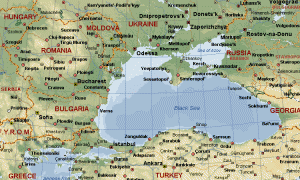
After being introduced to Cousins’ daughters, Khrushchev ushered his guests into the dining room and treated them to a magnificent lunch while regaling them with humorous stories. At one point he asked Cousins if any of them had observed all the flags that were on display on the roads and streets. The special occasion, Khrushchev told them, was that April 12th was the anniversary of the first ever flight into space by a human being, accomplished when Yuri Gagarin completed one orbit of the Earth in his Vostok spacecraft two years earlier on April 12th, 1961.
With the subject of the conversation being space exploration, Cousins commented that he had heard from a Soviet scientist that it wouldn’t be long before ordinary people were taking trips to outer space.
“It will be an interesting development, but it won’t happen next week,” Khrushchev said. “Still, things are being simplified very rapidly and we hope before long to announce that we have trained a female cosmonaut.”
“It would be interesting to get her reaction to a moon voyage,” responded Cousins.
“It would be interesting to get anyone’s reaction to the moon,” said Khrushchev.
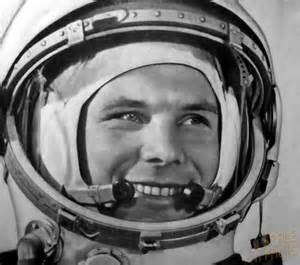
He then relayed to Cousins that his scientists had told him that they were already capable of putting a man on the moon, but they just were not sure they could get him back. With tongue firmly in cheek, Khrushchev then informed the scientists that the moon voyage definitely needed to be a round trip.
Following lunch the Soviet leader took his guests on a walking tour of his estate, the highpoint of which was a visit to the Chairman’s sport house, which included a gymnasium and a magnificent glass enclosed swimming pool. Khrushchev demonstrated for Cousins how, with a push of a button, the glass doors would retract allowing access to the pool. In fun Cousins commented to Khrushchev that nowhere in the capitalist world had he seen a private swimming pool equal to the one in Khrushchev’s sport house. Khrushchev responded in kind, saying that American society was still very young and that they would probably have such a pool in due course.
Following the visit to the pool Khrushchev took Cousins and his girls to the gymnasium. Noting all the different forms of exercise equipment, Cousins asked the Chairman which form of exercise he preferred. There was no delay in Khrushchev’s answer. Pointing to the badminton racquets he told Cousins that he played badminton twice daily, in the morning and late afternoon. Khrushchev and Cousins then engaged in a friendly but competitive game of badminton. Cousins was amazed that, though he was 69 years old, Khrushchev had such remarkable agility, reflexes and stamina. The Chairman wasn’t even breathing hard after the match. Cousins then got Khrushchev’s permission to take some photos of the Soviet leader playing badminton with his daughters, one of which I have included in this article.
The badminton match over, the girls were turned loose and Cousins and Khrushchev got down to the business at hand. To Cousins, though Khrushchev had been the gracious host, the Soviet leader seemed burdened and somewhat withdrawn compared to their visit in December. Much had happened in the intervening months. The Communist Chinese were asserting that Khrushchev, because of his appeasement of the Americans during the Cuban crisis, had demonstrated that he was unfit to lead the Communist world and that he had no desire to overthrow the capitalist West, as they claimed was mandated by the writings of Marx and Lenin.
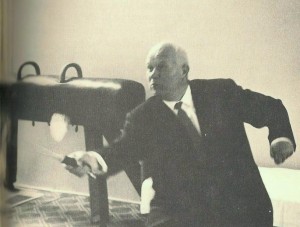
Khrushchev had held his own against these accusations, stating that what he did in Cuba was in no way appeasement. He had put the missiles into Cuba as a deterrent to U.S. invasion; when Kennedy pledged not to invade the threat was removed, so he removed the missiles. Nuclear holocaust, he pointed out, had been averted, and that was the most important thing. Khrushchev continued his defense by stating that anyone who knew anything about nuclear weapons would realize there was no alternative to peaceful co-existence, and he charged that the Chinese were attempting to apply dogma in situations it did not fit. On top of the Chinese pressure, in the near future two significant events were looming for Khrushchev, those being the bi-annual Plenum [2] of the Soviet Communist Party, and an upcoming visit to Moscow by representatives of the Communist Chinese Party and government. Khrushchev expected these events to present significant challenges to both himself and his policies. Indeed, one reason he was currently at his Black Sea retreat was to prepare for them.
Cousins opened the discussion by thanking Khrushchev for releasing Archbishop Slipyj. He also expressed the Pope’s regrets at the apparent breach of faith caused by the bogus newspaper articles published after the Archbishop’s release that claimed he was tortured by the Soviets.
Khrushchev graciously indicated that he understood, and then inquired as to the Pope’s health. The Soviet leader said that he often thought of the Pope and was inspired by his desire to contribute to world peace in the time he had left to him. On hearing this Cousins thought the time was appropriate to present to the Chairman the advance copy, translated into Russian, of the Pope’s encyclical “Pacem in Terris” that he had brought with him.
Khrushchev was pleased to accept the gift and inquired of Cousins if there were any parts of the encyclical that they should discuss now. Cousins took this opportunity to direct the Chairman’s attention to several key passages of the encyclical stressing the need for the nations of the world to conduct their affairs in the human interest and to end the arms race. As stated in the encyclical:
“There is a common belief that under modern conditions peace cannot be assured except on the basis of an equal balance of armaments and that this factor is the probable cause of this stockpiling of armaments…Consequently people are living in the grip of constant fear. They are afraid that at any moment the impending storm may break upon them with horrific violence. And they have good reasons for their fear, for there is certainly no lack of such weapons. While it is difficult to believe that anyone would dare to assume responsibility for initiating the appalling slaughter and destruction that war would bring in its wake, there is no denying that the conflagration could be started by some chance and unforeseen circumstance. Moreover, even though the monstrous power of modern weapons does indeed act as a deterrent, there is reason to fear that the very testing of nuclear devices for war purposes can, if continued, lead to serious danger for various forms of life on earth…. Hence justice, right reason, and the recognition of man’s dignity cry out insistently for a cessation to the arms race. The stock-piles of armaments which have been built up in various countries must be reduced all round and simultaneously by the parties concerned. Nuclear weapons must be banned. A general agreement must be reached on a suitable disarmament program, with an effective system of mutual control.”
Impressed by the passages Cousins had referenced, Khrushchev again indicated his respect for Pope John’s efforts and told Cousins he would study the entire encyclical. The two men then briefly discussed the hope of Pope John that Khrushchev would consider intervening with the Czech government on behalf of Catholic Archbishop Josef Beran, who had been imprisoned for many years. Khrushchev said he was not familiar with the Beran case but would take the matter under advisement.
The discussion then moved to the subject of the Test Ban Treaty. With regard to the impasse in the negotiations, Khrushchev stated his case in plain language:
“If the United States really wanted a treaty, it could have had one,” the Chairman said. “If it wants one now it can have one. The United States said it wanted inspection. We don’t believe inspections are really necessary. We think they are an excuse for espionage. Our scientists proved to me that new instrumentation makes it possible for you to detect any violations from outside our borders. But we wanted a treaty and the United States said we couldn’t get one without inspections. So we agreed, only to have you change your position.”
Cousins responded by telling Khrushchev that there was a misunderstanding as to what the U.S. position really was. To this Khrushchev said that he did not see how there could be a misunderstanding. His chief negotiator had reported to him that the U.S. representatives had indicated that they were ready to proceed on the basis of a few annual inspections, as did other trusted sources. Based on this Khrushchev had gone before his Council of Ministers and had told them:
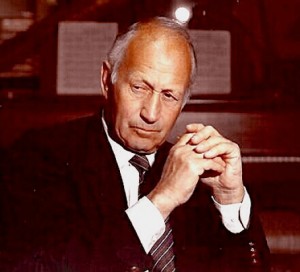
“We can have an agreement with the United States to stop nuclear tests if we agree to three inspections. I know that these inspections are not necessary, and that the policing can be done adequately from outside our borders. But the American Congress has convinced itself that the on-site inspection is necessary and the President cannot get a treaty through the Senate without it. Very well then, let us accommodate the President.”
Based on Khrushchev’s data the Council had approved the three inspections ,and when the U.S. then demanded eight Khrushchev was humiliated. It appeared to many in the Communist world, particularly the Chinese, that the Soviet leader was naïve in thinking that he could peacefully co-exist with the U.S. when it was obvious through this and earlier incidents that the U.S. did not want to reciprocate.
Khrushchev well recalled one of those earlier incidents. Three years before, on May 1st , 1960, a U-2 spy plane piloted by Francis Gary Powers was downed over the Soviet Union only two weeks before a major summit meeting was to take place between then President Eisenhower and Khrushchev in Paris. The summit in Paris and an already scheduled follow up trip to the Soviet Union were to be the culmination of what Eisenhower called his “Crusade for Peace”. The old General was coming up on the end of his second term and wanted to defuse the dangerous Cold War and leave to future generations a legacy of peace. He had established a working relationship with Nikita Khrushchev toward this end, and the two leaders had built a certain level of trust. Knowing the American President loved golf, Khrushchev was even preparing a golf course in anticipation of Eisenhower’s visit.
It was against this backdrop that the U-2 came down in the Soviet Union. [3] At first Khrushchev couldn’t believe that Eisenhower had anything to do with the U-2 flight and attempted to convince the Council that, based on his belief in Eisenhower, he could proceed with the summit and Eisenhower’s trip to the Soviet Union. Then the President announced that he had authorized the flight, which of course came across to Khrushchev as a significant betrayal and made him look like a naïve fool to the Council.
Now, in the Test Ban negotiations with regard to the inspections issue, it had happened again. As Khrushchev told Cousins:
“…once again I was made to look foolish. But I can tell you this: it won’t happen again.”
In the task of shifting the Chairman’s view on the Test Ban Treaty, Cousins could see he had his work cut out for him. He assured Khrushchev that the President had no intention of humiliating him and that what had occurred with regard to the number of inspections was a legitimate misunderstanding. He summarized the U.S. view that there were over 100 seismic events in the Soviet Union annually that made it difficult to remotely monitor underground nuclear testing. He presented to Khrushchev the President’s idea that Geneva negotiators continue working to resolve the other more minor points in question, and that the issue of inspections be worked out by the President and the Premier together.
Khrushchev quickly responded that the President’s idea was neither practical nor possible. He said that for various reasons neither leader at that time could travel to the others nation.
“Where does that leave us?” Khrushchev queried.
“It leaves you with the rest of the world in which to find a place,” Cousins answered. “Vienna [4] served the purpose once before. And if not Vienna then another place. But even if no place can be found, then there are other forms of communication.”
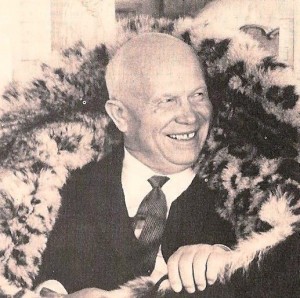
Khrushchev then laid his cards on the table.
“You don’t seem to understand what the situation is here. We cannot make another offer,” he said. “I cannot go back to the Council now. It is now up to the United States. Frankly, we feel we were misled. If we change our position at all it will not be in the direction of being more generous. It will be less generous…If you can go from three (inspections) to eight, we can go from three to zero.”
The Soviet leader then went on to say that Cousins should know something else. His atomic scientists and generals were pressing him to continue with more nuclear tests; that the security of the country required it. They claimed that the United States had conducted seventy percent more tests than the Soviets and that despite the fact that the Soviet Union had recently successfully tested the largest nuke ever (100 megatons) they still needed more tests to catch up. Khrushchev concluded by saying:
“My scientists want a green light to go ahead; I think I may decide to give it to them.”
On hearing this Cousins was silent for a few moments. Khrushchev looked at him expectantly.
“You are looking at a depressed man,” Cousins said.
He then told Khrushchev that he had come to the Soviet Union in order to bear witness to the President’s good faith and desire to complete the treaty, but it appeared that the Soviet Premier didn’t believe this. He told Khrushchev that his response that he was probably going to resume testing would only lead to the United States resuming testing, and ultimately to other nations testing nuclear weapons as well. More poisons would enter the atmosphere and this helped no one’s security.
Then Cousins took a calculated risk.
“There is something else that occurs to me at this point,” he said. “Last summer President Kennedy was informed by a Soviet representative that missile bases were not being installed in Cuba. Perhaps it will be said that this was a misunderstanding. Under the circumstances, perhaps one misunderstanding can cancel another.”
On hearing this Khrushchev regarded Cousins sternly for a few moments. Then he responded:
“Very well,” he said. “You want me to accept President Kennedy’s good faith? All right, I accept President Kennedy’s good faith. You want me to believe that the United States sincerely wants a treaty banning nuclear tests? All right, I believe the United States is sincere. You want me to set all misunderstandings aside and make a fresh start? All right, I agree to make a fresh start.”
Through the Soviet leader’s words and appearance Cousins could sense his frustration.
“The Soviet Union now proposes to the United States a treaty to outlaw nuclear testing—underground, over ground, in water, in space, every place,” Khrushchev said. “And we will give you something you don’t really need. We will give you inspections inside our country to convince you we aren’t really cheating. We make our offer, you accept it, and there’s no more nuclear testing. Finished. If the President really wants a treaty, here it is.”
Both Cousins and Khrushchev knew that the Chairman had said nothing of the number of inspections and that his proposal, therefore, could never be accepted.
“The President,” Cousins ventured, “has come down a great deal from the original twenty-two inspections, but he knows no way to come all the way down to three. The Senate would never accept it.”
Khrushchev was exasperated.
“We are repeating ourselves,” he said. “Just so there is no mistake about it in your mind, let me say finally that I cannot and will not go back to the Council of Ministers and ask them to change our position in order to accommodate the United States again. Why am I always the one who must understand the difficulties of the other fellow? Maybe it’s time for the other fellow to understand my position.”
Cousins took in what Khrushchev had to say and responded by telling him that the President does understand the position the Russian leader is in.
“That is why he suggests that misunderstandings be put to one side and that a fresh start be made,” Cousins said.
There was a pause in the conversation and Khrushchev exhaled while leaning back in his chair. The moment was pregnant. Then Khrushchev spoke:
“Very well,” he said. “I agree. You can tell the President I accept his explanation of an honest misunderstanding and suggest that we get moving.”
“But,” the Soviet leader added, “the next move is up to him.”
To be continued…
Copyright © 2013
By Mark Arnold
All Rights Reserved
[1] Nikita Khrushchev, when he was in power, was referred to by either the title of “Premier” or of “Chairman”. In actual fact the post was “Chairman of the Council of Ministers” but was also called “Premier”.
[2] During the Soviet period, the term plenum referred specifically to a meeting of all members of a Communist Party committee at a national, regional, or local level. According to the Rules of the Communist Party of the Soviet Union, the Central Committee was required to hold a plenum at least once every six months, attended by both full and candidate members
[3] It is a matter of debate whether the Powers U-2 was shot down or simply lost engine power and crash landed. As reported by L. Fletcher Prouty in his book “JFK: The CIA, Vietnam and the Plot to Assassinate John F. Kennedy” the CIA’s Richard Bissell was the official running the U-2 over flights in 1960. Eisenhower had ordered that no over flights were to occur during the critical period leading up to the summit. Yet the Powers flight was authorized by someone, most likely Bissell. In closed door testimony before the Senate Foreign Relations Committee none other than CIA Director Allen Dulles testified that, despite Soviet claims that it was shot down, the U-2 came down because of engine trouble. Eisenhower also confirmed this. Considering the critical timing it is entirely possible that the Powers U-2 had been sabotaged for the purpose of destroying the prospects for a successful summit. Much like Kennedy had taken responsibility for the Bay of Pigs fiasco a year later, Eisenhower was forced to say he had authorized the U-2 or open himself to charges he did not control his government.
[4] Vienna was the location of the Kennedy-Khrushchev summit in 1961

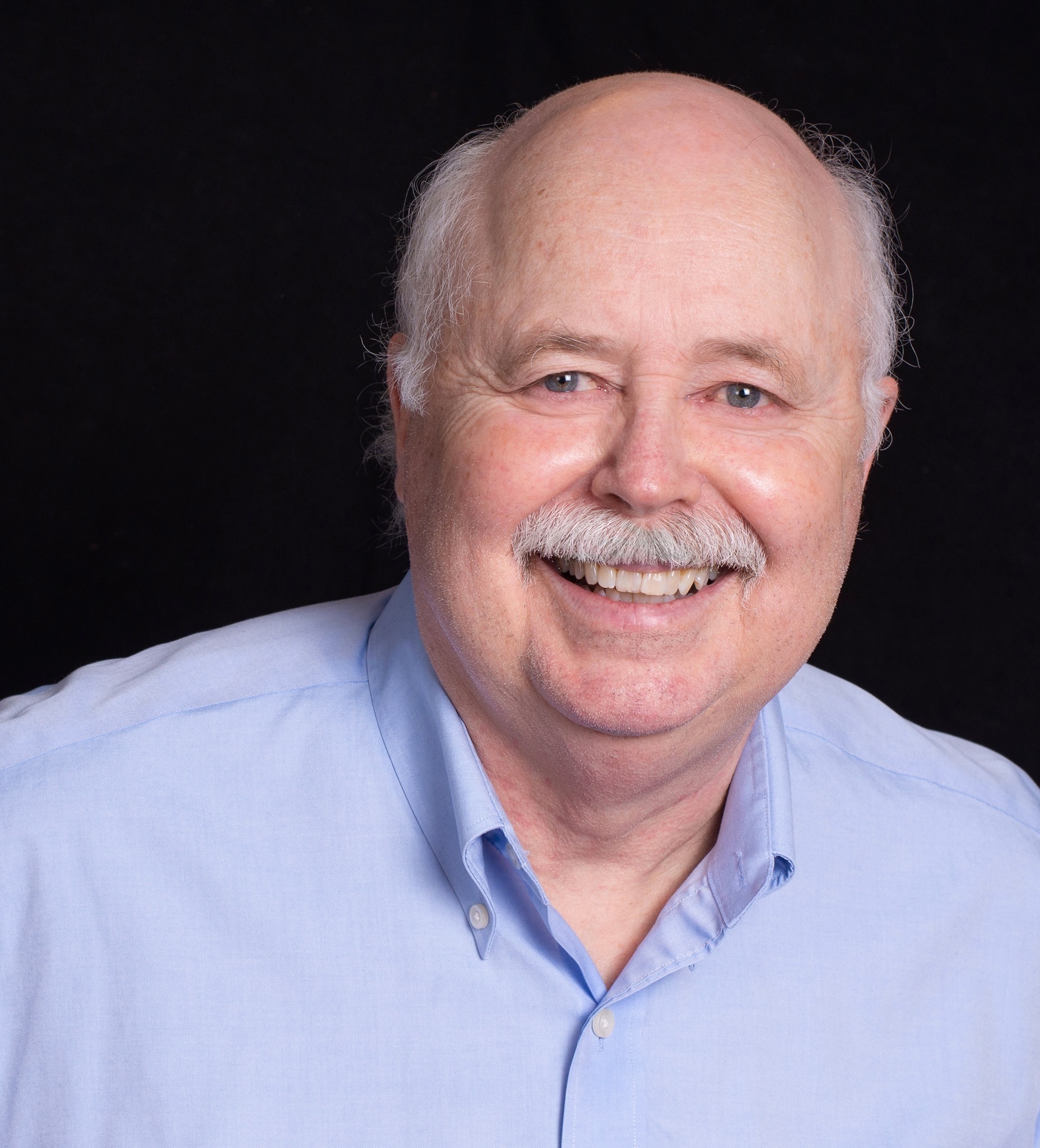
3 Responses
As always Mark, excellent.. Thank you for this insight. I had always thought Nikita Khrushchev was evil and low down. This work shows differently….ML
Thanks Mike! While I am sure that Khrushchev had his low down moments, on balance he was a man who saw the need to end the Cold War and the arms race and who tried to do something about it. I believe that history should be kind to him for that alone. MA
Thanks very interesting blog!
Here is my webpage; jeux steam gratuit